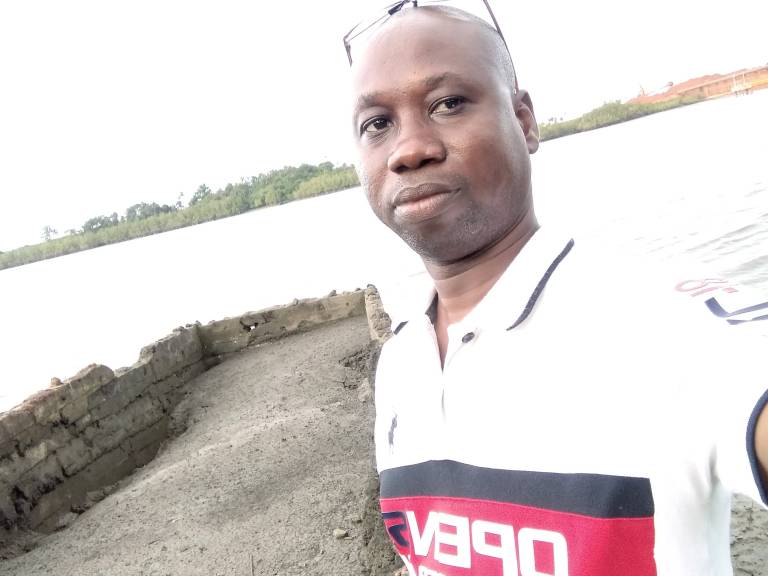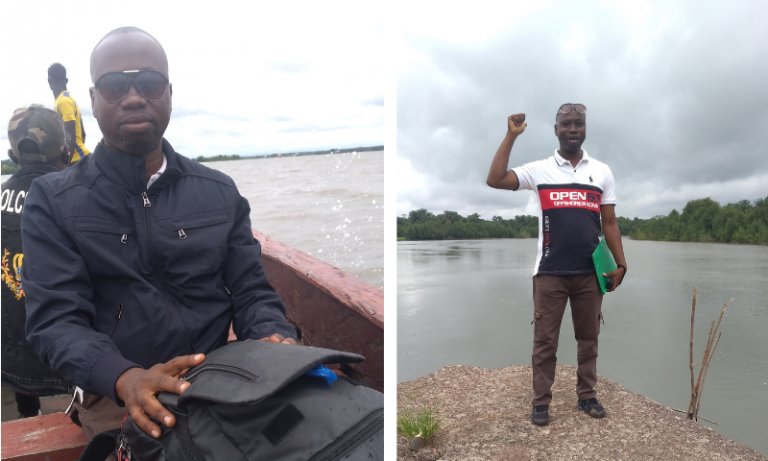UCL History chats to Dr Brahima Kaba, Julius NYÉRÉRÉ University, about Black History Month
21 October 2021
We spoke with Dr Brahima Kaba, Assistant in Modern & Contemporary History at Julius NYÉRÉRÉ University (Guinea). Dr Kaba is a partner of the project 'African Abolitionism: The Rise & Transformations of Anti-Slavery in Africa' (AFRAB). We spoke to him about Black History Month.

1. Hello Dr Kaba, thanks for taking the time to talk to us. You are a partner of the UCL collaborative project African Abolitionism: The Rise and Transformations of Anti-Slavery in Africa (AFRAB). Can you tell us a bit more about your role in the project?
My role in the AFRAB Project is as an associated researcher and I analyse the abolitionist action in Guinea which is my study area.
2. October is Black History Month in the UK. What does this mean to you and how do you hope the project will contribute to our understanding of Black History?
The act of dedicating a month to black history in the United Kingdom is good and something to be welcomed because it allows us to know more about black history in general and that of Africa in particular. The AFRAB project is part of this logic because it sheds light on the action of African abolitionists as Western historiography has not sufficiently spoken of the actions of African anti-slavers who have nevertheless played a large part in the fight against exploitation of man by man because there were also African slavers. Particularly in Guinea, we could cite the action of Sékou TOURÉ who fiercely fought this phenomenon from his childhood until his death. As slavers in Guinea, we have the theocratic kingdom of Foota Jalon, the Moriyah dynasty in Mellacoré, Samory TOURÉ in Upper Guinea, Nyara Beli and certain mulattoes like her in Rio Pongo, some local Bagas chiefs, Landoumas in Kakandé ( Rio Nunez),…

3. You are a specialist on some of the main anti-colonial leaders in the region, such as Sekou Toure and Leopold Sedar Senghor. Why do you think the study of the anti-colonial struggle in Africa is so crucial when thinking about Black History?
The study of the anti-colonial struggle in Africa is so crucial when we think of black history, because this period today conditions the evolution of black African societies which are still dependent on former colonizing nations; hence the phenomenon of neo-colonialism especially in the former French colonies except Guinea which today continues to jealously keep its anti-imperialist character given its brutal separation from France which has done everything through the Jacques FOCART network to sabotage its development so that the other ex-colonies remain subject. Through the study of colonial history with its torments, we will one day be able to break the umbilical cord that binds us to this predatory France like a Doberman that hardly lets go of its prey.
Images:
Photo 1: I stopped at the boat crossing point in Domiya, Niger located 5 km east of Boffa on the Rio Pongo. It was occupied by several slavers of different nationalities: Portuguese, French, Germans, there is little left remaining of this site today. Apart from the boat crossing point, there is a chapel built in 1862 by Charles Wilkinson, a descendant of slave traders, Fort PZ, the burial place of two Germans, ... This is where the famous mulatto slave woman Nyara Beli de Farenya embarked her slaves for South Carolina (USA).
Photo 2: I am in a makeshift canoe on the sea leaving Katounou on the left bank of the Rio Nunez which is much more of a defence site than a commercial site because it is located on a hill, for Kanfarandé a favourable place for commercial activities. This situation is reinforced by its position at the crossroads of two rivers: the Canof and the Nunez, thanks to which it receives products from Europe and those coming from Boké and the North Foutanien by caravan routes. Today, the traces are the ruins of the SCOA, PZ, CNF, CFAO houses and those of the shops of Lebanese-Syrians like Klett, of the Greek Basil Papa Postelo.
Photo 3: I stopped by the boat crossing point of the port of Boké (Rio Nunez), a city located between the Republic of Guinea and Guinea Bissau. Placed on the Foota Jalon road, Boké is a favourable place for commercial transactions between Fouta and the Landouman country on the one hand and between Foota and Guinea Bissau on the other. The only traces of slavery are shops, the port and the fort, a two-storey building and the road of no return. Most of the slaves from this area were sent to Brazil, especially Sao Paulo.
Publications by Dr Brahima Kaba:
- " Migrants guinéens ou candidats à la mort en Méditerranée (2000-2016) ", in Folofolo, Revue des humanités et civilisations africaines, N° décembre 2018, pp. 46-64.
- " Approche explicative de la relation conflictuelle entre Léopold Sedar Senghor et Sékou Touré (1958-1973) ", in Performances : Revue scientifique pluridisciplinaire, N° 8, décembre 2018, pp. 79-94.
- "Appartenance ethnique et vie politique en Guinée de 1945 à 2015", Magazine Sociétés & Économies, numéro spécial - Colloque 2019, pp. 25-41.
- " Les plans de développement en Guinée (1960 à 2000) : une chimère ? ", in Revue gabonaise d'histoire économique et sociale (JGHES), N°8 juillet 2021, pp. 63-75.
Responses in the original French:
1 - Mon rôle dans le projet AFRAB est que je suis un chercheur associé au projet et j’analyse l’action abolitionniste en Guinée qui est ma zone d’étude.
2 - Le fait de dédier un mois à l’histoire des Noirs au Royaume-Uni est une bonne chose car cela permettrait de connaitre d’avantage l’histoire des Noirs en général et celui de l’Afrique en particulier. Le projet AFRAB s’inscrit dans cette logique car il met à la lumière l’action des abolitionnistes africains car l’historiographie occidentale n’a pas suffisamment parlé des actions des anti-esclavagistes africains qui ont été pourtant pour beaucoup dans la lutte contre l’exploitation de l’homme par l’homme car il y avait également des esclavagistes africains. Notamment en Guinée on pourrait citer l’action de Sékou TOURÉ qui a farouchement combattu ce phénomène depuis son enfance jusqu’à sa mort. Comme esclavagistes en Guinée, nous avons le royaume théocratique du Foota Jalon, la dynastie des Moriyah dans la Mellacoré, Samory TOURÉ en Haute Guinée, Nyara Beli et certains mulâtres comme elle dans le Rio Pongo, certains chefs locaux Bagas, Landoumas dans le Kakandé (Rio Nunez), …
3 - L’étude de la lutte anticoloniale en Afrique est si cruciale lorsque l’on pense à l’histoire des Noirs, car cette période conditionne aujourd’hui l’évolution des sociétés africaines noires qui sont toujours tributaires des anciennes nations colonisatrices ; d’où le phénomène du néocolonialisme surtout dans les anciennes colonies françaises excepté la Guinée qui aujourd’hui continue de garder jalousement son caractère antiimpérialiste vu sa séparation brutale avec la France qui a tout fait à travers le réseau Jacques FOCART pour saboter son développement afin que les autres ex-colonies restent soumises. À travers l’étude de l’histoire coloniale avec ses affres, l’on pourra un jour rompre le cordon ombilical qui nous lie avec cette France prédatrice comme un doberman qui lâche difficilement sa proie.
 Close
Close

